
Topics
Guests
- Rami KhouriPalestinian American journalist and distinguished public policy fellow at the American University of Beirut.
Thousands of mourners attended a funeral for 12 senior Houthi figures in Yemen’s capital of Sana’a on Monday after they were killed by Israel in an airstrike last week. The dead included the Houthi prime minister, Ahmed Ghaleb al-Rahawi. The Houthis have ruled the capital and much of northern Yemen for over a decade. For the last two years, Houthi fighters have regularly launched missiles at Israel and attacked ships in the Red Sea in what they described as actions in solidarity with Gaza.
The killing of the Houthi leaders is meant “to signal to the Yemenis and everybody else in the region that Israel will keep attacking anybody, will kill senior people — they don’t care about any laws or reprisals,” says Palestinian American journalist Rami Khouri, who warns that Israel is fueling an “endless war” in the Middle East.
Transcript
AMY GOODMAN: This is Democracy Now!, democracynow.org, The War and Peace Report. I’m Amy Goodman, with Juan González.
In Yemen, thousands of mourners attended a funeral today for 12 senior Houthi figures who were killed by Israel in an airstrike Thursday. The dead included the Houthi prime minister, Ahmed Ghaleb al-Rahawi. The Houthi military leadership, that holds most decision-making power, was not targeted. Israel has previously targeted Houthi ports and infrastructure.
The Iran-backed Houthi rebels began launching missiles at Israel, most of which have been intercepted, and attacks on commercial ships in the Red Sea after the start of Israel’s war on Gaza, in what they have called actions in solidarity with the Palestinian people. The Houthis have controlled Sana’a and much of northern Yemen since 2014.
This is Omar al-Bukhaiti, Houthi deputy minister of information.
OMAR AL-BUKHAITI: [translated] Our message today to those inside and abroad is a message of challenge and steadfastness and that we are standing side by side with our revolutionary and political leadership. We present a convoy of martyrs to join the ranks of the martyrs of the leadership of the government of change and construction. Many have gone, and many will come. We will make sacrifices for the sake of the cause, for the sake of the challenge, for the sake of the steadfastness with our brothers in the Gaza Strip.
AMY GOODMAN: Meanwhile, Israeli Prime Minister Benjamin Netanyahu has vowed to continue the retaliation campaign against the Houthis. He addressed the Israeli security cabinet on Sunday.
PRIME MINISTER BENJAMIN NETANYAHU: [translated] The Houthi terror regime is learning the hard way that it is paying and will continue to pay a very heavy price for its aggression against the state of Israel. … Whoever attacks us, we attack them. Whoever plans to attack us, we attack them. I believe the entire region is learning about the strength and determination of the state of Israel.
AMY GOODMAN: To discuss this and more, we go to Rami Khouri. He is a Palestinian American journalist who’s covered the Middle East for five decades, distinguished public policy fellow at the American University of Beirut, nonresident senior fellow at the Arab Center in Washington, D.C., joining us from Newton, Massachusetts.
Rami, thanks so much for being with us. Can you talk about the significance of this Israeli strike on Yemen on Thursday, and who exactly was killed?
RAMI KHOURI: Well, thanks for having me.
The strike was significant in several ways. It’s not a big deal that Israel is killing leaders in different Arab countries all around the region. They have been doing that for decades. It is significant that they are doing this now, after there’s been a bit of a lull in Yemeni attacks by Ansar Allah, the Houthis. The Americans more or less pulled out of that war in Yemen. And now there is a big signal that Israel is sending, that they’re going to go after top leaders in any country that they feel threatens Israel. So, it’s significant that they’ve done this.
They know that the attacks haven’t really impacted much in Yemen, in the sense that the people who were killed, even though they were senior officials, were not major decision-making people. The decisions in Yemen are really in the hands of the Political Leadership Council, which is headed by the head of the Ansar Allah movement. And the people in the government — the prime minister, the defense minister and others — carry out the policies that are set by this higher political council.
So, the impact is really to signal to the Yemenis and everybody else in the region that Israel will keep attacking anybody, will kill senior people — they don’t care about any laws or reprisals. And this is a troubling fact, because it just means that endless war is one of the possibilities that we might face in this region.
JUAN GONZÁLEZ: Yeah, and, Rami, I wanted to ask you precisely about that, this continued expansion of the targets of Israel — Syria, Lebanon, Iran — and in addition to the genocide that they’re perpetrating in Gaza and the continued attacks in the West Bank. What is the impact of this continued expansion of its targets and of the leaders of these various countries on the rest of the Arab governments and leaders of the Middle East?
RAMI KHOURI: Well, this is significant, because the Yemenis have been involved in attacking Israel since the Gaza genocide started. They say it’s to support the Palestinians and to put pressure on the Israelis to stop the genocide. Hezbollah said the same thing, that they’re attacking to help the Palestinians. The minute that Israel stops the genocide, both Hezbollah and Ansar Allah in Yemen said they would stop attacking Israel or Israeli targets.
This is different now. This is a Israeli-Yemeni conflict, not a conflict in which Yemen is supporting Gaza and Palestinians. And this is the danger here, that we’ve seen this going on for the last probably 10 years or so that the center of gravity of the Israeli-Palestinian or the Zionist-Arabism conflict has expanded from its core in Palestine for the last 75 years, is now involved in Syria, Iraq, Iran, Yemen and other places possibly. And this is what’s really dangerous about this, because it might also bring in the Americans again, if the Ansar Allah keep attacking ships. They attacked a ship yesterday, a cargo ship, off the Saudi coast. And this, of course, disrupts international shipping. It has strategic implications, economic implications for the whole world, which usually means the U.S. is going to step in, because if U.S. economic dominance in the world is ever threatened, it takes action, because that’s its most important goal.
And so, this is very significant as a symbol of the expanding conflict, and it also reminds us that the Israelis have never had a strategy about how to coexist, how a Jewish-majority Israeli state, which they created in 1948 — how that could coexist not just with the Palestinians, but with everybody else in the region. They’ve never had a strategy. Their strategy has been military force, relying on Western imperial powers, first the British, then, after the ’50s, the Americans, and intimidating people, killing as many people, and now the next level, of course, genocide in Gaza.
The Israelis could possibly take part of Yemen. I would guess they’re going to probably take Hodeidah port, which is strategic for imports in Yemen, and just destroy it, turn it into rubble, like they’ve done in Gaza. I wouldn’t put this beyond them. And whether or not this brings about any reaction from the Western — alleged Western democracies who care about human rights remains to be seen.
JUAN GONZÁLEZ: And in almost all media coverage of what happens in Yemen, the country is always referred to as the Iranian-backed Houthis in control of Yemen. We never, for instance, talk about the U.S.-backed Israel in our media accounts of what Israel does. What exactly is the relationship between the Houthis and the Iranian government?
RAMI KHOURI: The Iranian government has clearly helped the Yemenis. Ansar Allah is the name of the movement. They’ve helped them a lot strategically, technologically, in other ways, training. The Yemenis produce a lot of their own military hardware, some of their missiles and other things. They’ve also got very sophisticated protection capabilities. Because of the landscape in Yemen, because of the size of the country — it’s massive, full of mountains and valleys and rivers and wadis, and so they’re able to protect their resources better than, say, Hamas could or Hezbollah could. And the Yemenis have relied heavily on the Iranians and also on Hezbollah. Hezbollah did some of the training of the Ansar Allah fighters and the technology.
So, there is a strategic relationship between Iran and all of the groups in the Arab world that were part of what Iran called the resistance axis, which took a big hit in the last two years. But as we see, they’re still there. They’re still fighting. They’re still making a statement. And we don’t know where this is going to lead, but it could very well lead to a much bigger war in the region and could again draw in the Iranians and the Americans.
AMY GOODMAN: And, Rami Khouri, the two governments, one the Houthi government, in which the prime minister was just killed by Israel, what level of popular support do they each have in Yemen?
RAMI KHOURI: Well, the Ansar Allah government that the Houthis created in the north of Yemen controls much of the northern part of Yemen. And the so-called internationally recognized government, is the way it’s called, who are based in Aden in the south, they control some of the southern regions, some of which are oil-producing regions and strategic port areas.
The Ansar Allah government, like most Arab governments, is not a democratic force. It is there because it took over in a military coup some years ago. And they enforce their incumbency and their rule by autocratic means. And now they’ve stepped that up. And by the way, in the last couple of months, there’s much more internal monitoring, repression, arrests, because they’re being attacked, as we saw earlier this week.
And they have a lot of support, but they don’t have unanimous support. And this is something that applies to all governments in the Arab world, that they have some genuine support, but not unanimous. And there’s people in North Yemen who would rather not have perpetual warfare as their destiny, but they can’t do anything about it. And in the south, of course, it’s the same thing. The people in the south, who are headed by various former officials in unified Yemen with Yemeni support — sorry, with Saudi support, United Arab Emirates support — the UAE has a kind of a base in the south of Yemen now — and some international support. These are not, you know, wildly loved democratic movements, but they are in power.
And people like — many people in Yemen, North Yemen, like the fact that they resist, even though they’re going to get the hell — you know, beaten up really badly, because this is what the Israelis and the Americans do. They use their military power. But they like — the resistance is a part of their philosophy, part of their DNA. And the Yemenis have been resisting for about the last 2,000 years. They’ve had all kinds of — every, you know, colonial, imperial, regional power has tried to attack them, even from the Romans in the first century. There was a Roman general who tried to go down and take over the spice routes, and they threw him out. So, this is part of the regional scene.

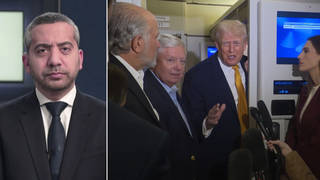
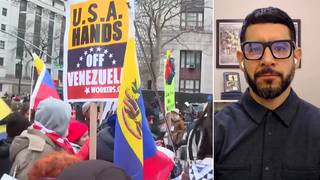

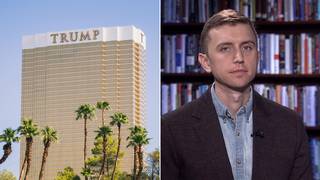

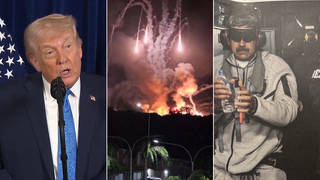
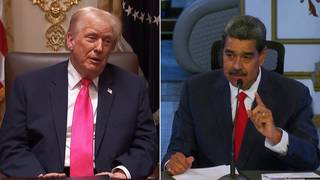
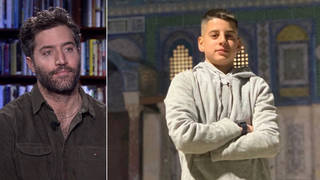


Media Options